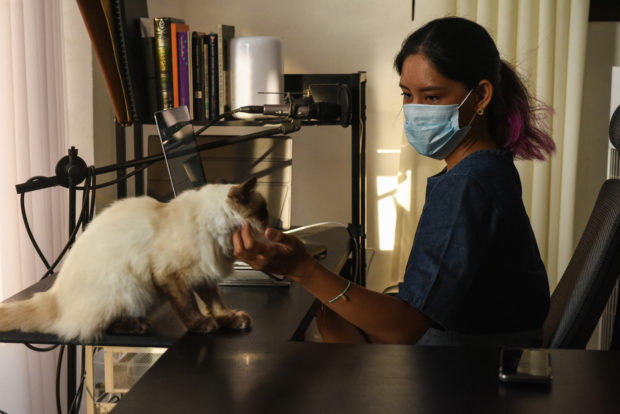‘Work from beach’ suits Pinoy digital nomads
MANILA, Philippines — After months cooped up in coronavirus-hit Manila, Tanya Mariano fled the Philippine capital to work from the beach, joining a growing number of digital nomads helping a devastated tourism industry stay afloat.
A ban on foreign holidaymakers entering the archipelago nation and domestic travel curbs since the pandemic began last year have forced many operators to close and wiped out millions of jobs.
Many digital workers in congested Manila, fearing COVID-19 and fed up with lockdowns and restrictions, are escaping to largely deserted nature hot spots to do their jobs—injecting much-needed money into communities dependent on outside visitors.
Sitting with her laptop on the balcony of the ocean-view apartment she rents with her boyfriend in San Juan, a surf town several hours north of her home, Mariano says the move has been a “big quality of life improvement.”
“Being close to the ocean, being close to nature is very calming,” said Mariano, 37, a freelance writer and communications specialist.
Article continues after this advertisement“When I’m in a meeting, usually Zoom or Google Meet, I try not to use the beach as my background—I just show people the wall so they don’t hate me.”
Article continues after this advertisement![This photo taken on June 2, 2021 shows digital nomad, Carlo Almendral (L), the chief executive of an artificial intelligence start-up, sitting with others as they relax at the beach in the town of San Juan, La Union province, north of Manila. - Many digital workers in congested Manila, fearing Covid-19 and fed up with lockdowns and restrictions, are escaping to largely deserted nature hotspots to do their jobs -- injecting much-needed money into communities dependent on outside visitors. (Photo by Maria TAN / AFP) / TO GO WITH AFP STORY PHILIPPINES-HEALTH-VIRUS-LEISURE-ECONOMY, FOCUS BY ALLISON JACKSON / “The erroneous mention[s] appearing in the metadata of this photo by Maria TAN has been modified in AFP systems in the following manner: [name as Carlo Almendral, and caption info] instead of [Carlo Almendal]. Please immediately remove the erroneous mention[s] from all your online services and delete it (them) from your servers. If you have been authorized by AFP to distribute it (them) to third parties, please ensure that the same actions are carried out by them. Failure to promptly comply with these instructions will entail liability on your part for any continued or post notification usage. Therefore we thank you very much for all your attention and prompt action. We are sorry for the inconvenience this notification may cause and remain at your disposal for any further information you may require.”](https://newsinfo.inquirer.net/files/2021/06/000_9BU79F-620x414.jpg)
This photo taken on June 2, 2021 shows digital nomad, Carlo Almendral (L), the chief executive of an artificial intelligence start-up, sitting with others as they relax at the beach in the town of San Juan, La Union province, north of Manila. AFP
Dramatic impact
There are no official figures on the number of people working remotely from the country’s picture-postcard beaches and dive spots but it is certainly a fraction of the millions of tourists that usually flock to its shores.
The impact of COVID-19 travel restrictions on the sector has been dramatic: $37 billion slashed from the economy and the loss of over two million jobs, according to World Travel and Tourism Council data.
Bravo Beach Resort on the southern island of Siargao—a renowned surfing destination—has felt the pain acutely.
Normally packed out with local and international tourists, it now averages around five to 10 guests at any one time—about 10 percent of its capacity—said general manager Dennis Serrano.

This photo taken on June 1, 2021 shows Tanya Mariano with her pet cat at her apartment in the town of San Juan, La Union province, north of Manila. AFP
‘Ghost town’
With the resort hemorrhaging as much as P200,000 ($4,180) a month, he hopes the situation will be “back to normal” by next year.
Even the white-sand resort island of Boracay has been turned into a “ghost town,” according to Eugene Flores, manager of La Banca House boutique hotel, where most of the rooms are filled with long-term digital nomads from Manila.
Official figures show arrivals to the island fell to less than 335,000 last year, compared with more than two million in 2019.
“When you go out you can see shops, you can see restaurants, you can see hotels that are really closed. Only a few are open,” Flores said.
The glacial pace of the country’s COVID-19 vaccine rollout is likely to delay the full reopening of the country’s beleaguered tourism industry.
For now, digital nomads are a “target market,” said the Department of Tourism, encouraging resorts and hotels to cater to the “new breed” of travelers by offering fast internet and wellness activities.
The influx of mobile workers, whose Manila salaries stretch further in the provinces, is keeping businesses like Papa Bear restaurant in San Juan afloat.
“You are not completely bleeding out, you’re still bleeding out for sure, but you’re at least generating something to offset enough of it,” said owner Denny Antonino.
Digital nomads now make up 30 percent to 40 percent of his customers and he hopes the trend continues after the pandemic to even out the seasonal fluctuations.
“They’re able to do their work but in between meetings they can surf, they can go hiking, they can go to the falls—there are more things to do,” Antonino said.